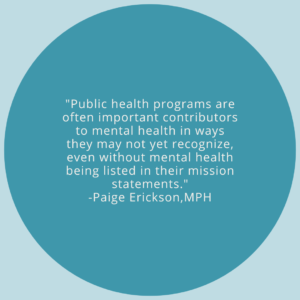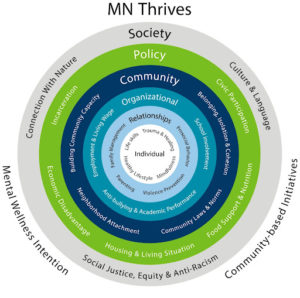#UMNMCH student Paige Erickson (she/they), MPH 2022, wrote this reflection on how her deployment with the Minnesota Department of Health (MDH) and the UMN Extension Center for Family Development let her explore mental health through a maternal and child health lens.
Path to the UMN MPH in MCH Program
Before coming to the School of Public Health, I worked full-time as a research assistant in a clinical psychology research lab. In exploring a career in research, I wanted to develop my skills with data and learn how to move beyond data into responsible and socially-mindful practice. The Maternal and Child Health (MCH) Program covered all bases, building key professional skills while emphasizing an interdisciplinary mindset. I have always been drawn to interdisciplinary work as someone with academic interests that often do not have a single cause or solution. In particular, child and adolescent mental health have always been complex issues close to my heart. My studies and deployment allowed me to explore mental well-being from an MCH Public Health lens, integrating various frameworks, cultural responsivity, and family-centered values to address a multi-faceted crisis and promote well-being.
Mental Illness Versus Mental Health
Many of the Healthy People 2030 goals related to mental health aim to address mental illness; for example, multiple goals aim to increase the number of children or adults who get treatment for disorders ranging from depression to ADHD. While access to care for people struggling with a diagnosed disorder is incredibly important, my deployment was centered on the idea that mental health is more than a diagnosis. Under the guidance of Cari Michaels, MPH, Extension Educator, from UMN Extension’s Center for Family Development, Anna Lynn, MPP, Mental Health Promotion Coordinator from the Minnesota Department of Health (MDH), and Sara Benning, MLS, Director of the MCH Center for Leadership Education, my work sought to demonstrate the variety of contributors affecting individuals’ mental well-being through a Social-Ecological Model (SEM). To gain background knowledge for my position, Cari introduced me to a second framework–the dual-continuum model of mental health. The dual-continuum describes mental health on two axes–the presence of a mental disorder and a wellness spectrum ranging from flourishing to languishing. In differentiating the presence of a diagnosis from overall mental health, the dual-continuum model validates all mental health states regardless of diagnoses. Once we accept that mental health is not simply the absence of mental illness, the SEM can step in to capture the breadth of factors that influence individual well-being across social, political, community, organizational, interpersonal, and personal domains. My work has been to help create an updated version of the SEM, and apply its core concepts through a mental health promotion project with the MDH.
While public health professionals generally agree that addressing mental health is important, many organizations and leaders don’t necessarily see their work as directly contributing to mental wellness. However, the Mental Health and Well-being Social-Ecological Model (SEM) illuminates how, as Anna often says, existing programs are “important pieces of the well-being puzzle.” Public health programs are often important contributors to mental health in ways they may not yet recognize, even without mental health being listed in their mission statements. When looking at individuals’ mental health as being influenced by social and policy factors, community resources, support systems, and other traditional biopsychosocial considerations, it is clear that many existing public health programs and interventions strongly affect mental and emotional well-being. Cari often notes that when she teaches the SEM and the dual-continuum model, the professionals she works with frequently have lightbulb moments and leave feeling inspired and empowered. My work with this team has demonstrated how essential public mental health education is, and how more is desperately needed.
From Framework to Practice: A Social-Ecological Model of Mental Health
My work with Anna, Cari, and Sara was two-fold in making the association between public health practice and mental well-being clearer for public health professionals. First, I spent time promoting the MDH’s interactive online tool and database, Minnesota Thrives. Thrives is a project that seeks to connect community health initiatives throughout Minnesota that improve mental well-being in a variety of ways. Among the 189 existing Thrives entries, various initiatives promote mental wellness through means such as engagement with nature, enhancing social connectedness, teaching mindfulness and stress management, and creating safe spaces to cope through grief. I spent much of my time connecting with professionals and organizations to expand the database. I also created graphics and promotional YouTube videos highlighting MoveMindfully and LiveMore ScreenLess, two of the many incredible community mental health initiatives featured in Minnesota Thrives.
Second, I am helping to further develop the Mental Health and Well-being SEM, as we aim to create a living document that represents current research and actionable items for public health professionals. A learning module brought the model to Dr. Zobeida Bonilla’s Spring 2022 Foundations of MCH Leadership course, where she assigned students to develop practice statements and give feedback on the existing version of the Mental Well-being SEM. I organized those students’ statements to inform the development of a second version of the Mental Well-being SEM, in tandem with a literature review I am conducting to integrate the most current research available. I have also created a number of graphics and slide presentations to organize our statements and research for educational as well as documentation purposes.
My deployment and MCH education have shown me a world of public health practice beyond research, which has driven me to pursue interdisciplinary career goals based on turning data and theory into action and practice. My experiences over the past couple of years were invaluable and contributed to substantial personal, academic, and professional growth that I am deeply grateful for. I am so happy to have met and learned from this incredible team, and excited to continue working on these important issues well into the future.
Biography
Paige Erickson, MPH (she/they) is a recent graduate of the Masters in MCH Public Health program, with minors in Epidemiology and Sexual Health. She has her Bachelor of Science in Psychology with a minor in Neuroscience from the University of Minnesota. Their professional interests lie in promoting mental health among LGBTQ+ children and adolescents. In her time, she enjoys doing all things creative, game nights with her friends, and cuddling up with her cat (Itzhak Perlman) and a good book. They live with their partner in Minneapolis, Minnesota, and hope to pursue a career that utilizes their creative and technical skills in equal measure to promote and integrate public and mental health.
References
Keyes, C. (2002). The mental health continuum: From languishing to flourishing in life. Journal of Health and Social Behavior, 43(2):207—222. https://doi.org/10.2307/3090197
Office of Disease Prevention and Health Promotion. (n.d.). Mental health and mental disorders. Healthy People 2030. U.S. Department of Health and Human Services. https://health.gov/healthypeople/objectives-and-data/browse-objectives/mental-health-and-mental-disorders
Michaels, C., Blake, L., Lynn, A., Greylord, T., & Benning, S. (2022, April 18). Mental health and well-being ecological model. Center for Leadership Education in Maternal & Child Public Health, University of Minnesota–Twin Cities. Retrieved December 1, 2022, from https://mch.umn.edu/resources/mhecomodel/.
Minnesota Thrives. (2022). Minnesota Department of Health. Retrieved December 1, 2022 from https://www.health.state.mn.us/communities/mentalhealth/mnthrives.html
Minnesota Thrives: Move Mindfully. (2022). Minnesota Department of Health Youtube channel. Retrieved December 1, 2022 from https://youtu.be/9I3JG_1R4qIMinnesota Thrives: LiveMore ScreenLess. (2022). Minnesota Department of Health Youtube channel. Retrieved December 1, 2022 from https://youtu.be/khtLqOO9Y54
–Read Student Spotlight archives
Interested in learning more about getting a degree in MCH? Visit our MCH Program page for more information.
#UMNMCH #UMNproud #UMNdriven



